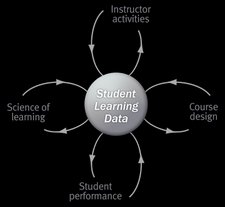 En un recent article de l’Inside Higher Education s’hi parla de Hybrid Education. Jo havia vist blended learning, i també educació semipresencial, o fins i tot educació a distància, online, etc. A l’Open Learning Initiative de la Carnegie-Mellon University no es vol contraposar docència amb professor a docència per ordinador, sinó només complementar-les per tal d’optimitzar el rendiment acadèmic de l’estudiant.
En un recent article de l’Inside Higher Education s’hi parla de Hybrid Education. Jo havia vist blended learning, i també educació semipresencial, o fins i tot educació a distància, online, etc. A l’Open Learning Initiative de la Carnegie-Mellon University no es vol contraposar docència amb professor a docència per ordinador, sinó només complementar-les per tal d’optimitzar el rendiment acadèmic de l’estudiant.
He vist aquesta entrada coincidint amb l’Informe Horizon, que aporta com a cosa destacada el canviant paper del personal acadèmic en l’educació superior.
Als USA no estan pensant en les noves metodologies pedagògiques que per les nostres contrades introduïm en paral.lel (no pas com a conseqüència del) Procés de Bolonya. Però està clar que intenten innovar i millorar el seu sistema.
De totes formes, crec que la utilitació de l’ordinador com a “mestre” funciona molt bé per als millors estudiants, aquells que es poden concentrar, aquells que tenen més habilitats informàtiques, aquells que amb qualsevol forma de procés de docència/aprenentatge funcionarien bé. El MIT, el CMU, Hardvard, són molt sel.lectius, i per això poden provar moltes coses amb els seus estudiants. Als universitats no tenen aquesta característica, i potser fins i tot tenen molt més de mèrit, en haver de formar estudiants menys capacitats o amb menys disponibilitat de temps per al seu procés d’aprenentatge.
En tot cas, segons l’IHE,
The university is currently exploring how the open-learning software could be used in conjunction with classroom education to speed up the teaching and learning process — a prospect that some involved think could help solve overcrowding in America’s community colleges and realize the Obama administration’s goal of boosting graduation rates.
De totes formes, el sindicat de professors americà hi veu alguna contraindiciació:
Gary Rhoades, general secretary of the American Association of University Professors, says that the intangible benefits of “contact with human beings” are still crucial to learning, and that plenty of research has said so. “So many of the effects that we seek from education… go well beyond the limited ‘learning outcomes’ that are defined for a specific subject matter in a specific class,” Rhoades says. “Those outcomes generally are connected to a narrow set of competencies focused on the specific subject matter.”
he vist que hi ha un curs de lògica (algun dia tinc ganes de seguir-lo) disponible per ser seguit al pas que cadascú desitgi. L’article de l’IHE en parla:
Thille says the current model relies on a credentialed instructor to confirm what written assessments suggest: that a student has either earned institutional credit or not. And while she does not dismiss this model, and makes clear that her institution has no plans to “do away with” professors, she does note that a logic course, currently taught to residential students for credit through the hybrid model, only involves a cursory level of instructor contact. “It’s completely taught self-paced and online, and they put a [teaching assistant] who is, in theory, responsible for being in the course,” Thille says. “Basically what they do is just monitor the grade books… The students are pretty much working through it on their own, and at some point they’re done, and then they get credit for taking logic.”
Encara que no sé si és gaire aplicable (crec que sí, en el nou marc pedagògic vinculat als nous plans d’estudi adaptats al Procés de Bolonya), l’IHE comenta sobre l’aprenentatge híbrid:
The virtual tutor takes care of the basic concepts that typically dominate lectures, leaving professors open to plan the face-to-face component of the course according to what parts of the curriculum the software tells him students are picking up more slowly, and what concepts could bear reinforcement. For example, if a statistics professor notices in the data he receives from activity in the open-learning program that a great number of students struggled with the assessments the program gave while teaching conditional probability, the professor could use the class periods to hold a discussion with his students about that concept until he is confident they get it — a preferable alternative, Thille says, to rolling through concepts didactically and hoping they stick.
Qualsevol millora val la pena. A més, tenir cursos lliures a la nostra disposició, com aquest de lògica, sempre és benvingut.